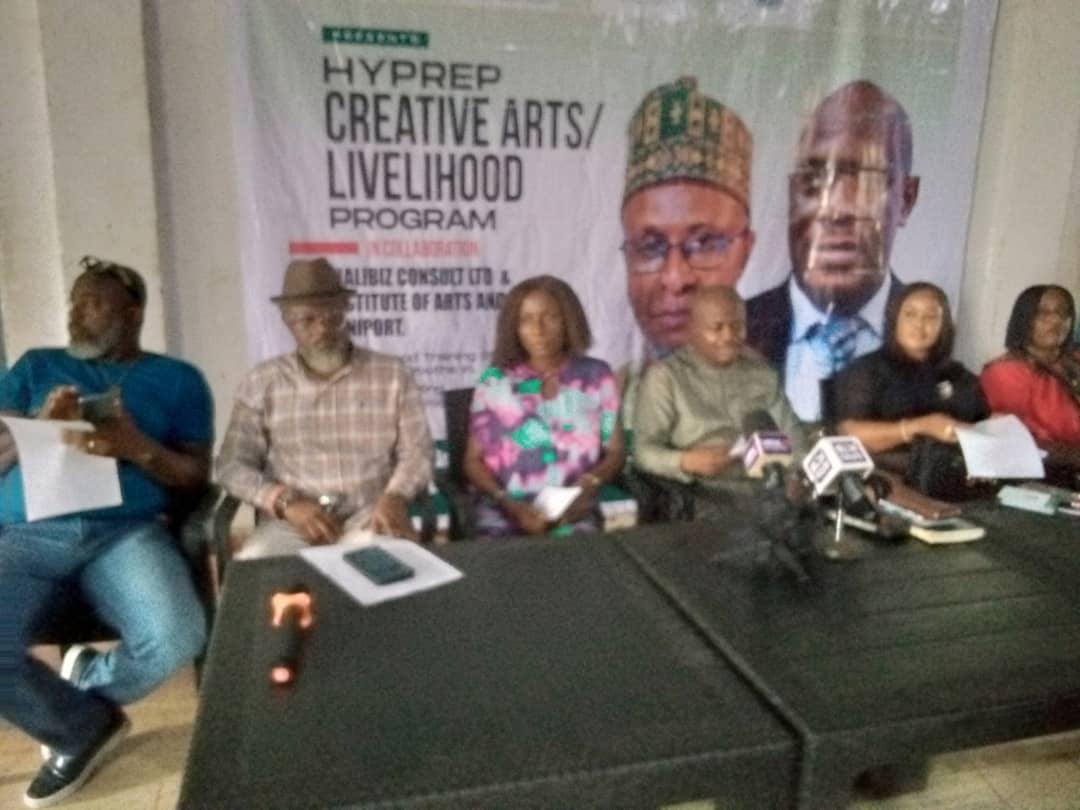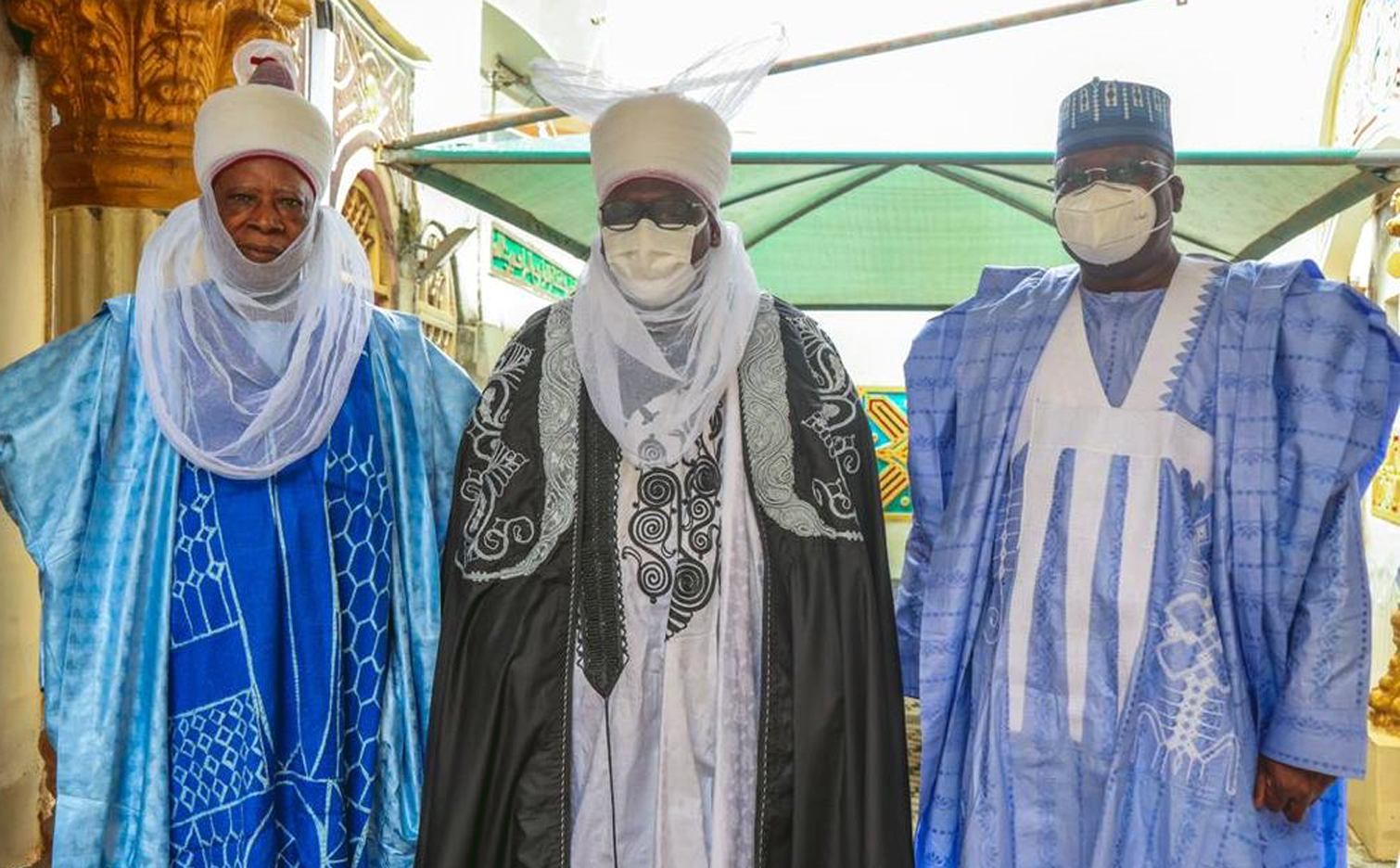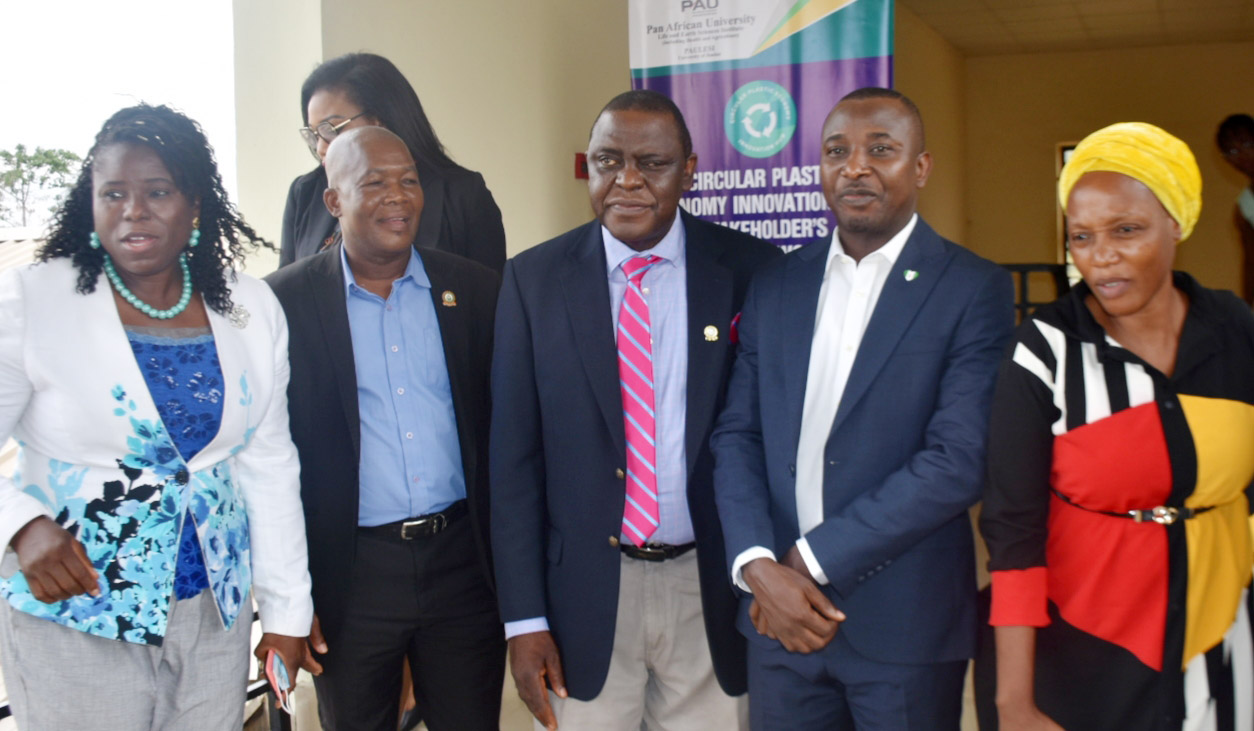Nation
FG Disburses N2trn To Mitigate Covid-19 Impact
The Central Bank of Nigeria (CBN) Governor, Mr Godwin Emefiele, yesterday, disclosed that the synchronized efforts by the monetary and fiscal authorities to mitigate the impact of the Covid-19 pandemic have led to the disbursement of N2trillion as of January this year.
Emefiele made the disclosure at the end of the first Monetary Policy Committee meeting of this year.
He revealed that N192.64billion has been disbursed to 426,016 beneficiaries of the Covid-19 Targeted Credit Facility (TCF) meant for household and small businesses.
“We have also disbursed N106.96billion to 27,956 beneficiaries under the Agri-Business Small and Medium Enterprises Investment Scheme (AGSMEIS), while in the Health Care Support Intervention Facility, we have disbursed N72.96billion to 73 project that comprise 26 pharmaceutical projects and 47 hospitals and Health Care Services Project in the country.
“To support the provision of employment opportunities for the Nigerian youth, the Central Bank of Nigeria also provided financial support through the Creative Industry Financing Initiative and Nigerian Youth Investment Fund amounting to N3.12billion with 320 beneficiaries and N268million with 395 beneficiaries, respectively.
“On enhancing power supply, the Bank has so far, provided N18.58billion for the procurement of 347,853 electricity reading meters to Discos in support of the National Mass Metering Programme”, the CBN governor revealed.
Emefiele noted that, under the Anchor Borrowers Programme (ABP), N554.63billion had been disbursed to 2,849,490 beneficiaries since the inception of the programme, of which N61.02billion was allocated to 359,370 dry season farmers.
The committee urged the Bank to sustain its current drive to improve access to credit to the private sector while exploring other complementary initiatives, in collaboration with the Federal Government, to improve funding to critical sectors of the economy.
On the external reserves position, the committee noted the increase in the level of external reserves, which stood at $36.23billion as at January 21, 2021 compared with $34.94billion at the end of November, 2020.
This reflected improvements in crude oil prices, partial global economic recovery amid optimism over the discovery and distributions of Covid-19 vaccines by most developed economies.
On efforts to stabilise food prices, Emefiele said that the bank has detected the unhealthy activities of private commodities exchange, a development that necessitates the repositioning of the Nigeria commodity exchange.
“We have written to the President and luckily, we have received the approval to restructure and reposition the Nigeria commodity exchange. It will operate like standard commodity exchanges that you can find in any part of the world which includes stabilizing of food prices generally. We will be coming up with the agenda and framework for the restructuring and repositioning of the Nigeria commodity exchange and we will do so in a manner that prices must be stable in Nigeria.
“We will not allow some self-seeking private exchange commodity to be holding agriculture products and be creating problems for prices because price stability is the core mandate of CBN and we cannot shy away from the responsibility, luckily the CBN own 60 per cent of Nigeria commodity exchange and we take control of it and will run it the way commodity exchanges are supposed to be run in any part of the world. That is one way that we would want to stabilize food prices in Nigeria”.
During the period under review, money market rates remained low, reflecting the prevailing liquidity conditions in the banking system.
Overall, the monthly weighted average Open Buy Back (OBB) rates declined further from the 1.13 per cent in November, 2020 to 1.09 per cent in December, 2020.
On the equities market, the committee noted the positive performance, particularly the sustained patronage by domestic investors largely driven by the prevailing low yields in the money market.
The All-Share Index (ASI) increased by 1.82 per cent to 41,001.99 points as at January 22, 2021 from 40,270.72 points on December 31, 2020.
Similarly, Market Capitalization (MC) grew by 1.80 per cent to N21.44trillion from N21.06trillion over the same period.
This improved performance was largely attributed to gains recorded in medium and large capitalized companies, notably in consumer goods, banking, insurance and oil and gas sectors.
The Monetary Policy Committee (MPC), however, noted the marginal increase in the Non-Performing Loans (NPLs) ratio which rose to 6.01 per cent at end-December, 2020 from 5.88 per cent at end-November, 2020 and above the prudential maximum threshold of 5.0 per cent.
While noting that this development is not unexpected under the prevailing circumstances, it urged the Bank to strengthen its macroprudential framework to bring NPLs below the prescribed benchmark.
Nation
HYPREP Inducts 100 Ogoni Youths For Creative Arts Training

The Hydrocarbon Pollution Remediation Project(HYPREP) has inducted and given orientation to 100 Ogoni youths for training on Creative Arts. The beneficiaries were drawn from Khana, Gokana, Tai and Eleme Local Government Areas of Rivers State.
The induction and orientation ceremony, which took place at the CRAB of the Department of Theatre Arts of the University of Port Harcourt on Wednesday, was a prelude to the training proper, billed to commence next Tuesday.
As usual, HYPREP issued undertaking forms to the trainees, for them to complete and submit as a guarantee that they would subject themselves to the requirements of the programme as well as be of good behaviour throughout the four-month duration of the training.
HYPREP also announced that it would pay N150,000 to each of the beneficiaries monthly, as transport and feeding allowance, stressing, however, that only those who fully participate in the training would be entitled for the allowance.
Speaking at the event, the Project Coordinator of HYPREP, Prof Nenibarini Zabbey, welcomed the trainees to the programme, saying, HYPREP’s projects are evolving and that one thing that is happening today is that the Project has gotten leadership right, by making promises and keeping those promises.
According to him, the Project had equally promised to move away from rudimentary skills acquisition to high impacts acquisition levels, which it has kept today by sponsoring the training on Creative Arts.
He noted that in planning its livelihood programmes for Ogoni youths, HYPREP has taken time out to look for skills that would add value to the lives of the beneficiaries.
Zabbey, who was represented at the event by the Director of Technical Services, Prof Damian-Paul Aguiyi said by packaging the Creative Arts training, it was expected that the Ogoni people would have their own version of Nollywood known as Ogoniwood just as Nigerians are familiar with Hollywood, Bollywood, Kannywood and Nollywood.
To achieve this goal, the Project Coordinator explained that it was the reason for choosing a reputable establishment like Halibiz Consult Limited, to partner with the Department of Theatre Arts of the University of Port Harcourt, which he described as one of the most prestigious in the Niger Delta, for the training of the beneficiaries.
He also indicated that in doing this, HYPREP was desirous of going for talents that would help the Ogoni people grow in the film industry, and urged the beneficiaries to take the training seriously.
Zabbey equally enjoined the trainees to put in their best so that in the next three to five years, they would carve a niche for themselves and become forces to reckon with in the film industry.
On her part, HYPREP’s Head of Sustainable Livelihood, Mrs Josephine Nzidee said HYPREP does what it says it will, stressing that the process of training Ogoni youths on specialised skills started three years ago.
According to her, the selection process for the training was rigorous and transparent, and was carried out by renowned actors actresses.
She disclosed that the training consists of three major aspects, which include acting, script writing and make-up, while Nollywood actors like Charles Nnoje, Ngezu J. Ngezu and award-winning make-up artist, Jude Odo would be on hand to drill and groom the beneficiaries.
Mrs Nzidee noted that the programme is a specialised training that does not have anything like starter packs but that it is purely a professional certification programme that would launch the beneficiaries into the Nollywood industry in Nigeria.
According to her, the Creative Arts training is one of the four specialised trainings organised by HYPREP to ensure that the Ogoni people are well positioned in vital industries like Aviation, Maritime, Creative Arts and Mechatronics.
She said the last of such trainings on Mechatronics would take place in the coming months, and urged the beneficiaries to take the training seriously so as to put the Ogoni people on the Nollywood map.
She further indicated that while Charles Nnoje and Ngezu J. Ngezu would take the beneficiaries on the practical aspects, Jude Odo would take them on the make-up aspects.
Also speaking, the External Relations Manager of Halibiz Consult Limited, Alabo Experience Douglas said his company gives much premium to standard and quality, and assured that the firm would give the trainees value for the money spent on the programme.
While charging the beneficiaries to be dedicated and punctual, he stressed the need for them to approach the programme with the mindset of being empty so that at the end of the day, they would benefit maximally.
On his part, the Head of the Theatre Arts Department of the University of Port Harcourt, Dr Ovunda Ihunwo said the CRAB is an acronym for Creative Review of Arts and Books, stressing that it was named by renowned playwright, Prof Ola Rotimi.
According to him, the CRAB had nurtured, groomed and produced Nollywood actors and actresses like Bobmanuel Udokwu, Ejike Asiegbu,Francis Duru, Hilda Dokubo, Monalisa Chinda, Julius Agwu, and a host of others, assuring the beneficiaries that they were on fertile environment to hone their talents.
He noted that symbolically, the crab is a nutritious seafood common in the Niger Delta, and reiterated the need for the beneficiaries to come empty for the training, as it were.
Ihunwo disclosed that the theory classes of the programme would run for three weeks while the fourth week would be for the master classes, and urged the trainees to avail themselves of the opportunity to make a difference by telling the Ogoni story, which he described as inexhaustible by themselves, in order to put Ogoni on the map.
Nation
Nasarawa Varsity Student Commits Suicide

A 23-year-old student of Nasarawa State University identified as Jatau Rilokwah, has been reportedly found dead in the university’s senior staff quarters.
A counter-insurgency expert, focused on the Lake Chad region, Zagazola Makama, disclosed this on his X handle on Tuesday.
According to him, the discovery was made on April 27, 2025, by a security officer at the university, Emmanuel Gyawo.
He stated that Gwayo was directed by Prof. Shedrack Jatau to check on his son upon arriving at the residence, and he found Rilokwah hanging from the ceiling.
“Professor Jatau, who was reportedly out of the State at the time, was informed of the incident. A team of police detectives, led by the Divisional Crime Officer of Angwan Lambu, was dispatched to the scene.
“The body showed no signs of violence, and no suicide note was found. Rilokwah was rushed to the Federal Medical Centre in Keffi, where he was confirmed dead by a medical doctor,” he further stated.
He added that the student’s corpse had been deposited in the hospital morgue.
He also quoted police sources as saying that investigations were ongoing to determine the circumstances surrounding the incident.
Nation
Ogun, Nike Art Gallery Set To Transform Olumo Rock

The Ogun State Government has partnered with Nike Art Gallery to establish a new exhibition space at the Olumo Rock Tourist Centre in Abeokuta, a move Governor Dapo Abiodun says is aimed at boosting annual tourist visits from 20,000 to over 100,000.
Abiodun disclosed the plan on Wednesday while receiving the founder of the Nike Art Gallery, Chief (Mrs) Nike Davies-Okundaye, at his office in Oke-Mosan, Abeokuta.
“I went to Olumo Rock about a month ago and I decided that we needed to do something about restoring Olumo Rock to its old glory. From statistics, Olumo Rock hosts about 20,000 people a year in its current state, and I felt that we could increase that to at least ten times,” the governor said.
As part of the plan, an events hall within the tourist centre will be repurposed as a permanent gallery operated by Nike Art Gallery.
“I told them to shut it down. Practically, we want to bring it down and turn it into a gallery for you to use as an exhibition gallery,” he told Davies-Okundaye.
He added that the gallery will be ready before the National Sports Festival in May, when the State will host about 15,000 visitors.
“I want them to be able to see our tourist sites,” he said, listing attractions such as the Olusegun Obasanjo Presidential Library, the Ransome-Kuti family home, and the Adire market among key heritage spots to be showcased.
Highlighting Ogun’s improved infrastructure, the governor said, “Now that we’ve succeeded in having the intra and inter-state roads in place, you can come to Ogun State by rail; you can come by air. We’ve constructed one of the best airports in Nigeria, and very soon, you will be able to come by sea.”
Davies-Okundaye, in her remarks, praised the state’s efforts to promote tourism and pledged to use the new gallery to attract global attention.
“This gallery will bring many Heads of State. The one I opened in Abuja already has more than 10 Heads of State, including those from South Korea and the Czech Republic. The same will happen here,” she said.
She also applauded the Governor for his commitment to the Adire fabric industry.
“Adire is all over Nigeria, but Ogun has been promoting Adire for over 50 years. Today, the only cloth we can call our own is called Adire. This is what we can sell to the Europeans,” she said.
Abiodun reaffirmed his administration’s backing of the Adire industry, citing policies such as the Adire Ogun Digital Marketplace, compulsory wearing of Adire in the state, and provision of solar-powered production equipment to support artisans.
He also revealed plans to open a creative arts and entertainment village in partnership with Bolanle Austen-Peters, expected to be completed within two months.

